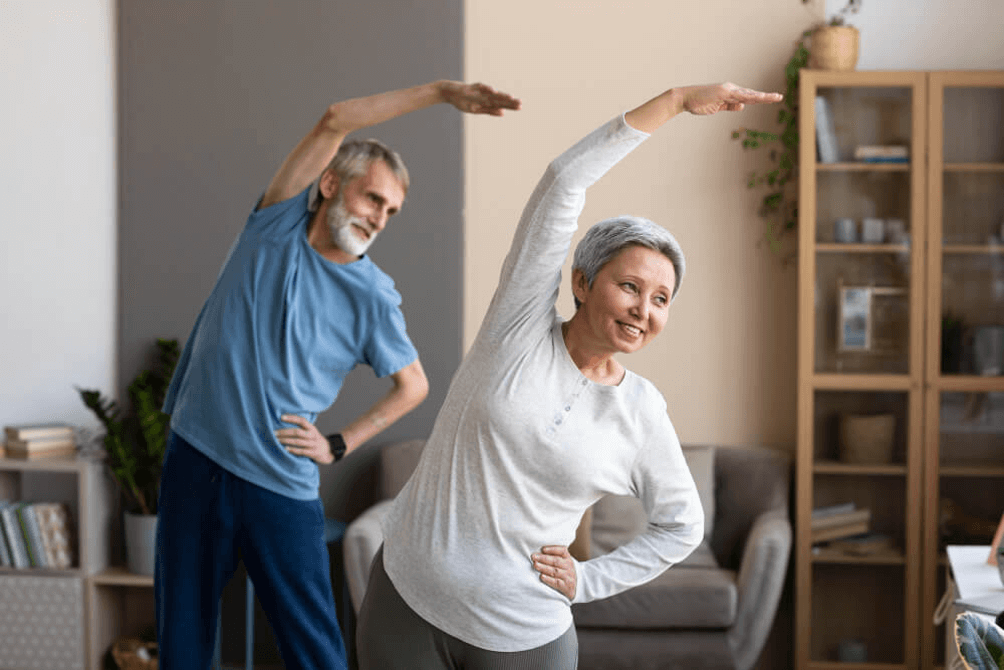Exercise is vital for overall health and well-being, but perhaps it is even more so in ageing and senior citizens. While there are certain hazards associated with seniors exercising, the advantages of living an active lifestyle far exceed the risks. Although it is true that seniors need longer to recover and heal from accidents, moderate exercise is beneficial to people of all ages.
The benefits of regular exercise and leading an active lifestyle for seniors go beyond the evidence, such as enhanced blood pressure, lipid panel, arthritis, osteoporosis and cognitive function.
Here are seven reasons why older people should incorporate exercise into their daily routine:
1. Improves cardiovascular strength
The endurance of your heart muscle develops with regular aerobic activity and strength training. For example, climbing steps, lifting grocery bags, or pruning plants will not place as much pressure on your heart if your heart muscle is stronger, lowering your chance of a heart attack. In addition, regular exercise can reduce blood pressure and raise energy levels, allowing you to engage in your favourite pastimes for longer periods without taking a break.
2. Reduces risk of Alzheimer’s or Dementia
Exercising increases blood flow to all body parts, including the brain. This aids the human body in flushing out undesirable substances from the brain, avoiding memory loss, information processing, and problem-solving challenges, all of which can lead to Alzheimer’s disease if left untreated. The activity also takes you out of the house, typically in the company of others, and allows you to communicate and connect with others, which helps to keep your mind fresh.
3. Great for bone health
Strength training routines do more than merely build and massify muscles. They make your body’s bones work even harder. As a result, you’re increasing bone density and muscle mass. Osteoporosis and osteopenia, the precursor of osteoporosis, can be reduced by increasing bone density. Therefore, you’re less likely to break bones, experience greater pain, and have restricted mobility.
4. Increases flexibility and range of motion
Regular exercise improves your body’s range of motion. Your body can’t do activities properly if a joint’s typical range of motion is restricted. For example, what may begin as a little discomfort when lifting a shopping bag may progress to the inability to put dishes away or walk to the yard over time. Regular strength training activities and stretches to preserve flexibility can assist in avoiding stiffness and joint mobility loss over time.
Exercise is vital even if you have an injury or limited mobility since it can help you avoid injuries in other parts of your body. How? When one part of your body becomes wounded, another compensates. For example, if a muscle is stiff or not operating properly, you may unintentionally engage another to compensate. As a result, you’re more likely to get injuries in the muscles and joints you’re compensating with.
5. Aids longevity
According to the World Health Organization, physical inactivity is one of the main causes of mortality worldwide. Inactivity can lead to heart disease, obesity, diabetes, a higher chance of colon cancer, and other possibly fatal health disorders. Regular physical exercise, such as swimming or walking, helps you get out of your chair and lowers your chance of developing some of these dangerous — and sometimes deadly — diseases.
Making a point to move about and be active, even if you aren’t participating in an organised activity like jogging or weight training, is critical to preserving your health. Walks around the neighbourhood, yard maintenance, and grocery shopping are all practical methods to get up and exercise every day.
6. Boosts mood and social wellness
It’s common for many individuals to suffer times of sadness or even despair as their lives change. Perhaps you’re adapting to retirement or a close friend unexpectedly passes away. Perhaps your lone kid relocated to explore a new career opportunity. Whatever the case may be, it’s common to feel down from time to time.
Endorphins, a hormone that increases mood and sensations of happiness, are released by all types of exercise. So engaging in an exercise class or fitness club aimed at older people is a terrific opportunity to connect and establish friendships with other seniors around and push your body.
For senior folks, the social advantages of exercise go a long way toward raising their mood and enhancing their perspective. However, if you’ve tried socialising and exercising regularly but still have persistent feelings of sorrow or despair, speak with your doctor. Although sadness is frequent among older persons, it is not a normal component of the ageing process and must never be neglected.
7. Improves sleep quality
Regular sleeping patterns accompany regular exercise. Temperature changes during and after an exercise can assist your body in falling asleep more quickly and getting the deep, restful sleep it requires to be healthy and strong. Regular restorative sleep gives you more energy during the day and helps your body retain higher levels of cognitive functioning — such as memory and concentration — and lowers your risk of injury due to weariness or decreased physical performance.
Conclusion
Even though regular physical activity is suggested, ensure you are aware of the basic fitness tips for seniors. Moreover, it’s crucial to see your doctor before starting a new fitness plan. Your doctor can assist you in determining which forms of exercise are best for you at your age and address any health concerns you may have. It’s critical to consult your doctor about exercise and how it affects your body.

